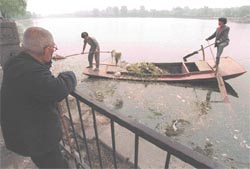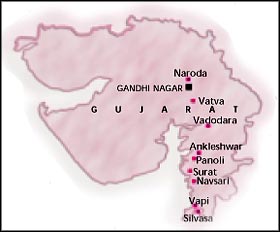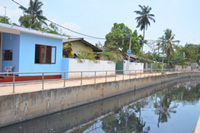The value of a raindrop
Rainwater is as usable to the industrialised North as to the underdeveloped South. As important to the poor, rural household as to the gardens and kitchens of the rich. Its value is universal
Rainwater is as usable to the industrialised North as to the underdeveloped South. As important to the poor, rural household as to the gardens and kitchens of the rich. Its value is universal

Rapid industrialisation has severely polluted the scarce water resources of China
A couple of decades from now, the West may have to combat an unprecedented water crisis. Contamination and wastage will only hasten the process

Where the floods meet the chemical badlands: an Ankleshwar factory
No matter all the huge efforts put together by experts and stake holders, proper management of the water resources of the State, including the Brahmaputra, will be a distant dream unless political willingness is accommodated in the water management initiatives. This observation was made by the Non Resident Indian Association of Assam, which has urged all the authorities concerned to take a serious approach to managing the enormous water resources for speedy economic development of the State. In a seminar organised by the NRI Association of Assam recently at its office premises in the city, water resources engineering expert of Texas, USA and hony adviser of river linking project initiated by the Government of Assam, Barada Charan Sarma stressed on the need for political willingness to resolve the problems created by the water resources. He dwelled at length on ways for solution of the devastating flood and erosion problems of Assam, and boosting development activities like power generation by utilising the vast water resources of the Brahmaputra. "To achieve these goals we all should understand that political accommodation will be necessary with regard to the development of the Brahmaputra,' he remarked. Members of the Association who took part in the seminar narrated their experiences verging on the nightmarish at the time of a smart downpour in the capital city. Earlier, Dr Karuna Sagar Das, general secretary of the Association explained its aims and objectives and expressed the NRIs' keen interest to be a part of the welfare activities of their homeland. The seminar was presided over by Dr Anil Ranjan Borthakur, president of the Association.
<p>People of 45 districts in Bangladesh, are at risk of contracting kala-azar as the fly-borne disease breaks out in different parts of country in recent times, found a study conducted by the International Centre for Diarrhoeal Diseases Research, Bangladesh (ICDDR-B) and Shaheed Suhrawardy Medical College and Hospital. Read more in October 2014 edition of the Monthly Overview on State of Environment, Bangladesh</p>
> Floods and cyclones play havoc with irrigation processes in the coastal areas of Andhra Pradesh. On the other hand, the Rayal-seema and Telengana regions with semiarid to arid climatic conditions

Criminals followed corrupt politicians into grabbing contracts related to earthworks. Today, they fund political parties and virtually run the state

Reduced to being a receptacle of household and industrial wastes and victimised by lopsided development, the Yamuna, Delhi's lifeline, is crying out for attention
<p><strong>Bangladesh alongwith Sierra Leone and South Sudan led a ranking of countries facing extreme risks as a result of climate change, exacerbating the chances of civil conflict, according to a study by Maplecroft. Read more in November 2014 edition of the Monthly Overview on State of Environment,Bangladesh.</strong></p>

Beleaguered as the Capital's authorities are by increasing demand, large scale wastage and heavy, unsustainable subsidies, the need for a more rational water management system assumes urgency.
<p>The International Centre for Integrated Mountain Development (ICIMOD) and the Gross National Happiness Commission (GNHC) signed a letter of agreement to start a program – called “Rural Livelihoods and Climate Change Adaptation in the Himalayas” – for improving rural livelihood in Bhutan. Read more in this March 2014 edition of the Monthly Overview on State of Environment, Bhutan.</p>

WESTERN nations are worried about increasing international migration. Says a 1992 document of Western nations, "Migration is now seen as a priority issue equal in political weight to other major

Reduced to filthy, foul smelling cesspools, with mosquito larvae arawing their lazy, intricate patterns on the green surfaces, the same takes and tanks in urban areas draw a passerby's game is when purple hyacinths bloom and disguise their filth. O
Enemies of health and allies of poverty join hand to create global havoc, leaving different marks on different classes

<p><span style="font-size:14px;"><strong>Lunawa Environmental Improvement & Community Development Project</strong></span></p> <p><img alt="" src="http://www.indiaenvironmentportal.org.in/files/country/srilanka/lunawara_hl.jpg" style="border-width: 2px; border-style: solid;" /></p> <p>The Lunawa Environmental Improvement & Community Development Project (2003-10), was the first ‘test’ of Sri Lanka’s National Involuntary Resettlement Policy. Today it is touted as an innovative, pro-poor model for infrastructure projects in the developing world, especially relevant for the involuntary resettlement of people from densely populated urban areas.</p>

Conventional politics breaks up the fiery spirit of an ideal self sustaining forest community

In their greed for more water for the capital city, planners duck the question of wasteful expenditure of local water sources
<p>Monthly Overview on State of Environment, Pakistan, Dec 2013 Erratic climate change events have hit the rice production in Pakistan this year and to take account of damages, the Food and Agriculture Organisation (FAO) in its end-of-the-season report has downgraded its production forecast for the country by 600,000 tonnes to 8.7 million tonnes (5.8m tonnes, milled basis). Read more in this December 2013 edition of the Monthly Overview on State of Environment, Pakistan</p>
Every year during monsoons, many towns in India experience heavy flooding. These floods some natural, others human induced result in a heavy loss of lives and property. ASESH K MAITRA, environmental planner and director, School of Planning and Archite